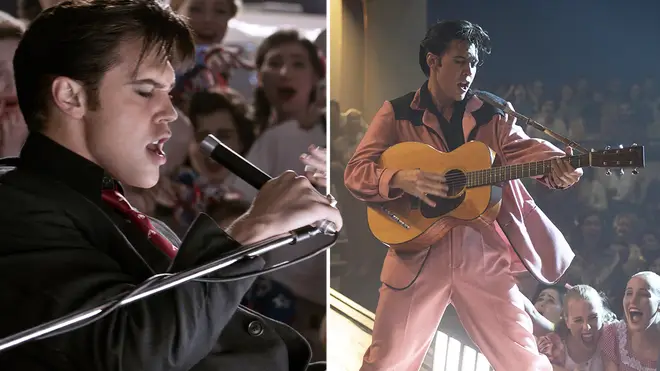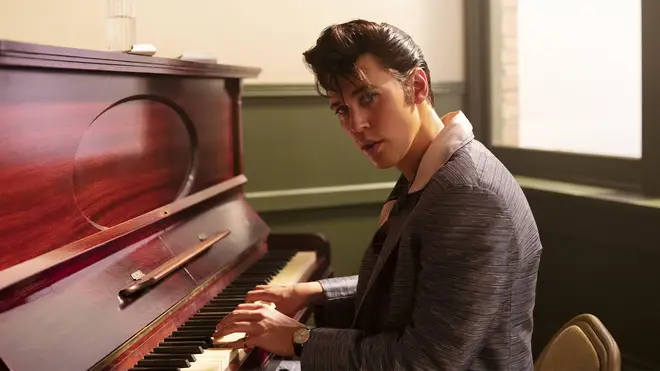Is Austin Butler really singing and playing guitar in ‘Elvis’ movie?
4 July 2022, 15:23 | Updated: 5 September 2022, 14:11

Watch Austin Butler transform in the Elvis trailer
Austin Butler went through an extraordinary vocal transformation to become Elvis Presley. But who is behind all the singing in the biopic?
Listen to this article
Elvis is a new biopic from Baz Luhrmann focusing on the legendary rock ‘n’ roll superstar, Elvis Presley. It documents the life and career of the singer, from his childhood, all the way to stardom.
The film recently became the third-highest grossing biopic since the 1970s, earning over £240 million at the worldwide box office to date.
In the starring role as The King himself is 30-year-old American actor, Austin Butler, and co-starring in the film is Tom Hanks, who plays Elvis’ manager Colonel Tom Parker.
Butler has appeared in major films including Quentin Tarantino’s, Once Upon a Time in Hollywood (2019), and his looks and even his natural, smooth southern speaking voice make him almost a dead-ringer for Elvis.
However, with the star having beaten the likes of Harry Styles and Ansel Elgort for the role, he has put in time to develop the perfect singing voice for his portrayal.
Speaking to The Hollywood Reporter, Austin explained, “When I began the process, I set out to get my voice to be identical. That instills fear. So that got the fire burning. For a year before we started shooting, I was doing voice coaching.”
Read more: Bradley Cooper’s Leonard Bernstein biopic is officially coming to Netflix

Is Austin Butler really singing in ‘Elvis’?
The short answer is, yes, that really is Austin Butler’s voice you hear in Elvis – with snippets of the real singer blended in later on. The actor watched multiple videos of Elvis performing, studying footage of films and concerts to perfect the singer’s voice.
Butler said he felt “such a responsibility to Elvis and to [ex-wife] Priscilla and [daughter] Lisa Marie, and all the people around the world who love him so much,” to get the portrayal right.
In the film, Elvis’ early voice is sung exclusively by Butler. But as the singer ages, Butler’s voice is blended with tapes of midlife Elvis to give as similar a vocal tone as possible, a decision made by the film’s director, Baz Luhrmann.
The Australian director is known for his reimaginings of William Shakespeare’s Romeo + Juliet (1996), and Scott Fitzgerald’s The Great Gatsby (2013).
Read more: Pope Francis reveals he loves Bach’s Passions and Elvis Presley

See how Austin Butler became Elvis in new promo
Is Austin Butler really playing guitar in ‘Elvis’?
As well as being a strong singer, Butler has been playing the piano and guitar since he was 13. Similarly to Elvis, the actor taught himself to play his instruments.
In an interview with Variety, he revealed he practised guitar so much as a child, that he resorted to supergluing his bleeding fingers back to together from over-playing.
Butler had a chance to show off his musical scenes on screen when he guest starred on the NBC comedy Are You There, Chelsea? as a band lead singer who was the title character of the show’s love interest in episode three. (Watch above).
Although he’s played on a major television network, and had 17 years of practice behind him, the singer still expressed nerves when he had to record his music for Elvis.
Butler revealed in his Variety interview that he struggled at first getting up on a stage to film in front of around 600 extras, in a bedazzled jumpsuit, trying to embody the king of rock ‘n’ roll.
“I learned that Elvis was very shy as a kid,” Butler explained, “and he would ask people to turn around when he played the guitar and turn off the lights in the room.
“And I thought, that’s how I feel now. But he overcame that,” and so did Butler.
Read more: 17 pop songs you didn’t know were directly inspired by classical music

Elvis Presley was a long-time classical music fan, and his former wife, Priscilla Presley, told Rolling Stone in 2016 that “Elvis always loved the great, operatic vocalists.
“We often talked about his interest in recording material that allowed him to perform in that space.”
The rock ‘n’ roll singer often borrowed tunes from classical music, as seen in one of his biggest hits, ‘Can’t Help Falling in Love’, which shares a little bit of its main melody with 18th-century composer Jean-Paul-Égide Martini’s Piacer d'amor.






















